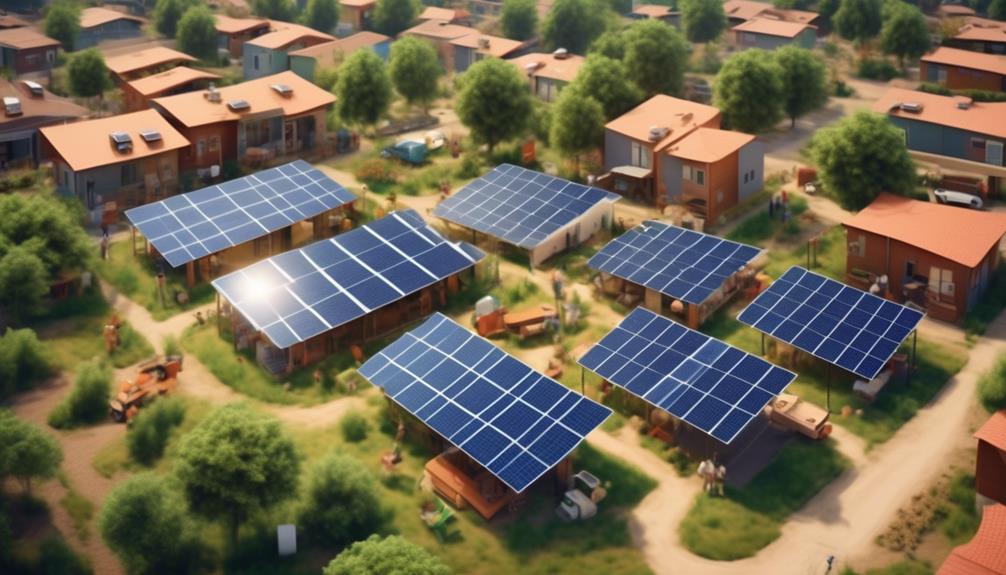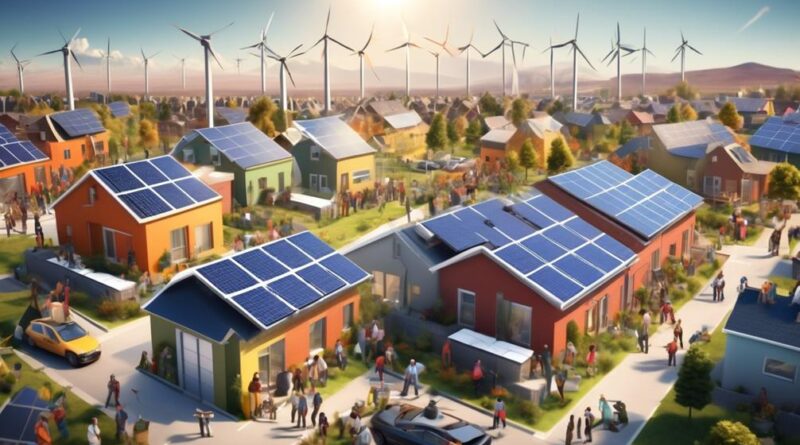Empowering Communities With Sustainable Energy Solutions
Imagine a world where communities are powered by the sun's endless embrace and the gentle caress of the wind. The shift towards sustainable energy solutions is not just a trend, but a necessity for the future.
As you ponder the potential impact of empowering communities with renewable energy, you'll uncover the intricate web of benefits that extend far beyond environmental conservation. The resilience of communities is tightly woven with the ability to harness sustainable energy, and the journey to understanding this connection starts with exploring the role of local engagement and the implementation of innovative solutions.
Importance of Community Resilience
Building community resilience is crucial for ensuring the sustainable development and continuity of energy solutions in the face of challenges and disruptions. Disaster preparedness is a key component of community resilience. By preparing for potential disasters, communities can minimize the impact of such events on energy infrastructure and ensure that essential services remain functional. From developing emergency response plans to investing in resilient energy systems, disaster preparedness plays a vital role in safeguarding energy solutions.
Community cooperation is another essential aspect of building resilience. When community members work together, they can pool resources, share knowledge, and support one another in times of need. This collaborative approach not only fosters a sense of unity but also strengthens the community's ability to address energy-related challenges. Whether it's establishing neighborhood support networks or organizing community drills, cooperation among residents is instrumental in enhancing overall resilience.
Advantages of Renewable Energy
Renewable energy offers numerous advantages that make it a sustainable and environmentally friendly choice for meeting our energy needs. From an environmental perspective, renewable energy sources such as solar, wind, and hydroelectric power produce little to no greenhouse gas emissions, reducing air pollution and mitigating climate change. By harnessing these natural resources, we can minimize our reliance on fossil fuels, thereby preserving ecosystems and biodiversity. Additionally, the decentralized nature of renewable energy systems empowers communities to generate their own power locally, reducing the need for large-scale transmission infrastructure and minimizing energy losses during distribution.
In terms of economic opportunities, the renewable energy sector has become a key driver of job creation and economic growth. The expansion of solar and wind farms, as well as the development of energy-efficient technologies, has led to the establishment of new businesses and employment opportunities in manufacturing, installation, and maintenance. Furthermore, investing in renewable energy can enhance energy security by diversifying the energy mix and reducing dependence on imported fuels, thereby stabilizing energy prices and bolstering energy independence.
Role of Local Engagement
Engaging local communities in sustainable energy initiatives can significantly impact the adoption and success of renewable energy solutions. The role of local engagement is crucial in driving the transition to sustainable energy practices. By involving communities in the process, you can foster a sense of local empowerment and create a sustainable energy ecosystem that benefits everyone.
Here's how local engagement plays a pivotal role in sustainable energy initiatives:
- Community Involvement: When local communities are actively involved in decision-making processes regarding sustainable energy solutions, it leads to a greater sense of ownership and responsibility. This involvement can range from participating in community meetings to being part of local energy cooperatives, allowing community members to have a direct impact on the energy solutions implemented in their area.
- Knowledge Sharing: Local engagement promotes knowledge sharing among community members, enabling them to understand the benefits of renewable energy and sustainable practices. This can lead to the development of localized solutions that are tailored to the specific needs and resources of the community.
- Behavioral Change: Through local engagement, communities can collectively work towards changing energy consumption behaviors. This can include initiatives such as community-wide energy conservation programs, promoting energy-efficient practices, and fostering a culture of sustainability within the local community.
Sustainable Living Practices
Consider incorporating sustainable living practices into your daily routine to reduce your environmental impact and promote a more eco-friendly lifestyle.
One way to do this is by adopting green transportation methods, such as walking, biking, carpooling, or using public transportation. By choosing these options, you can significantly reduce your carbon footprint and contribute to lower levels of air pollution. Additionally, you can consider investing in an electric or hybrid vehicle, which not only reduces greenhouse gas emissions but also lowers your fuel costs.
Another sustainable living practice to embrace is striving for zero waste. This involves minimizing the amount of waste you produce by reducing, reusing, and recycling. You can start by using reusable bags, water bottles, and containers to cut down on single-use plastics. Composting organic waste, such as food scraps and yard trimmings, can also divert a significant amount of waste from landfills. Additionally, purchasing products with minimal or recyclable packaging can help in reducing overall waste generation.
Incorporating these sustainable living practices into your daily life not only benefits the environment but also promotes a healthier and more conscious way of living. By making small changes, you can contribute to the larger goal of creating a more sustainable and eco-friendly world for current and future generations.
Implementing Solar Power Solutions
To further reduce your environmental impact and embrace sustainable energy practices, implementing solar power solutions can be a highly effective and eco-friendly option for powering your home or business. By harnessing the power of the sun, you can significantly reduce your reliance on traditional energy sources, while also enjoying the numerous benefits of solar energy.
When considering solar power solutions, it's important to understand the process of solar panel installation and the role of community involvement. Working with local solar installers can't only ensure a smooth and efficient installation process but also contribute to the growth of the solar industry within your community. This can create job opportunities and foster a sense of shared responsibility for sustainable energy practices.
The advantages of solar energy extend beyond environmental benefits. Embracing solar power can have a positive economic impact on both individuals and communities. By generating your own electricity through solar panels, you can potentially lower or eliminate your monthly energy bills. Additionally, any excess energy produced can be sold back to the grid, providing a source of additional income. This not only benefits you as a consumer but also contributes to the overall stability and resilience of the energy grid.
Wind Energy for Community Resilience
Harnessing wind energy can bolster community resilience and provide a sustainable power source for local needs. Wind turbine technology has advanced significantly, making it a viable option for renewable energy production.
Communities can benefit from this by embracing wind energy as part of their disaster preparedness strategy. Wind turbine technology has evolved to be more efficient, affordable, and adaptable to diverse geographical locations. By investing in wind energy infrastructure, communities can take control of their energy production, leading to greater empowerment and self-sufficiency.
Additionally, wind energy projects often create local job opportunities, further contributing to community empowerment. Renewable energy sources like wind power are crucial for disaster preparedness. During natural disasters, conventional power sources are often disrupted, leaving communities vulnerable.
However, wind energy can provide a reliable source of power during such times, ensuring that essential services remain functional. Furthermore, excess energy generated during non-crisis periods can be stored or shared with neighboring communities, establishing a network of mutual support and resilience.
Community-Based Microgrids

Empower your community with sustainable and resilient energy solutions through the implementation of community-based microgrids. Community-based microgrids offer a multitude of benefits, including energy independence, local ownership, decentralized energy, and shared resources. Here's how they can enhance your community's energy resilience:
- Energy Independence and Local Ownership:
Community-based microgrids enable your community to take control of its energy future. By generating and distributing energy locally, you reduce dependence on centralized utilities and external energy sources. This fosters energy independence and allows for local ownership of the energy infrastructure, empowering your community to make decisions that align with its unique needs and values.
- Decentralized Energy and Shared Resources:
These microgrids facilitate the decentralized generation and distribution of energy, leveraging a diverse range of renewable resources such as solar, wind, and hydro power. By sharing these resources within the community, you can optimize energy usage, reduce waste, and create a more resilient energy network. This collaborative approach ensures that the community can effectively manage its energy needs and respond to disruptions or emergencies.
Community-based microgrids not only provide reliable and sustainable energy but also foster a sense of ownership and cooperation within the community. By investing in these solutions, you can pave the way for a more resilient and empowered community, capable of addressing its energy needs in a sustainable and efficient manner.
Funding and Support for Sustainable Projects
Considering the financial backing and support for sustainable projects is crucial for ensuring their successful implementation and long-term impact. Project financing plays a pivotal role in enabling the development and deployment of sustainable energy solutions at the community level. Government grants are often instrumental in providing the initial capital required to kickstart these projects. This financial support helps cover the costs associated with infrastructure, technology, and operational expenses, making sustainable energy solutions more accessible to communities.
In addition to project financing, community partnerships are an essential component in driving the success of sustainable projects. Collaborating with local organizations, non-profits, and community groups fosters a sense of shared responsibility and ownership, enriching the sustainability of these initiatives. By working together, communities can leverage a diverse set of skills, resources, and knowledge, thereby enhancing the overall impact of sustainable energy projects.
Furthermore, corporate sponsorships present another avenue for funding and support. Many businesses are increasingly recognizing the importance of sustainable initiatives and are eager to support projects that align with their corporate social responsibility objectives. By forging partnerships with corporations, communities can access additional funding, expertise, and resources, further bolstering the implementation and success of sustainable energy projects.
Frequently Asked Questions
How Can Communities Ensure the Long-Term Maintenance and Sustainability of Renewable Energy Solutions?
You can ensure long-term sustainability of renewable energy solutions by collaborating with the community and implementing proactive maintenance strategies. Engaging locals in decision-making and regular maintenance can help secure the future success of renewable energy projects.
What Are Some Innovative Ways That Communities Can Engage Local Businesses and Organizations in Sustainable Energy Initiatives?
You can foster local partnerships by engaging with businesses and organizations in sustainable energy initiatives. Collaborate on projects, share resources, and leverage expertise to create a more sustainable and energy-efficient community.
Are There Specific Sustainable Living Practices That Have Been Particularly Successful in Empowering Communities With Renewable Energy Solutions?
You've seen a rise in community collaboration for renewable technology integration. Practices like community-owned solar projects and energy cooperatives have been particularly successful. These initiatives empower communities by providing sustainable energy solutions while fostering local engagement.
How Can Communities Address Potential Challenges in Implementing and Maintaining Solar Power Solutions?
You can address potential challenges in implementing and maintaining solar power solutions by actively engaging the community and providing solar education. This helps build support and understanding, ensuring successful and sustainable adoption of solar energy.
What Are Some Alternative Funding Sources and Support Options for Sustainable Energy Projects, Beyond Traditional Grants and Government Funding?
You can explore community financing options to raise funds for sustainable energy projects. Additionally, consider forming corporate partnerships to secure support and resources beyond traditional grants and government funding, allowing for more diverse and sustainable avenues for funding.
Conclusion
You've learned about the importance of community resilience and the benefits of renewable energy.
By engaging with local communities and implementing sustainable living practices, you can empower them with solar power solutions, wind energy, and community-based microgrids.
With the right funding and support, these sustainable energy projects can make a real difference in creating resilient and self-sufficient communities.
Keep supporting and investing in sustainable energy solutions for a brighter and more resilient future!
